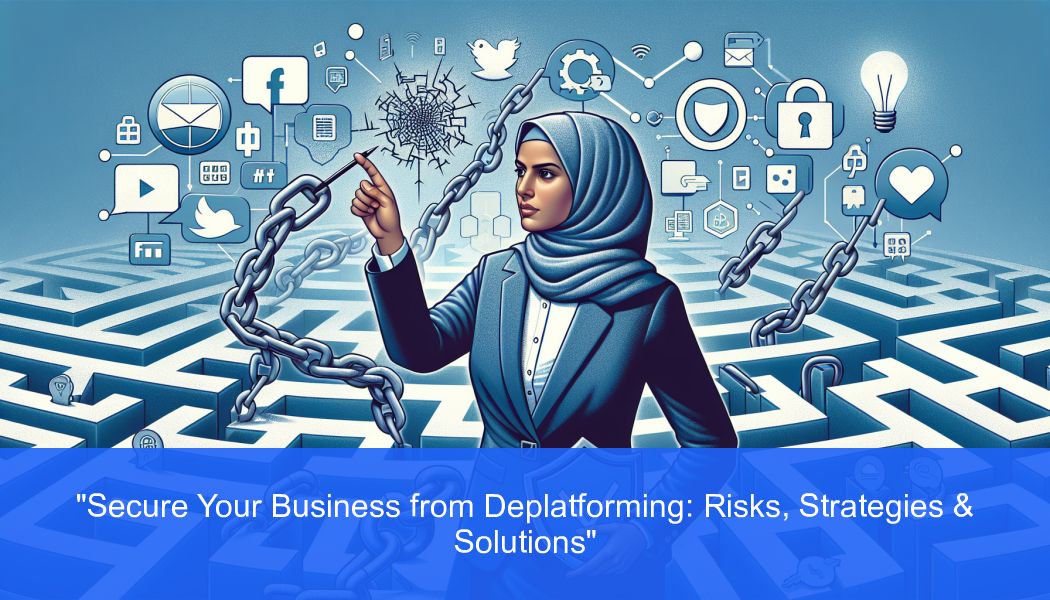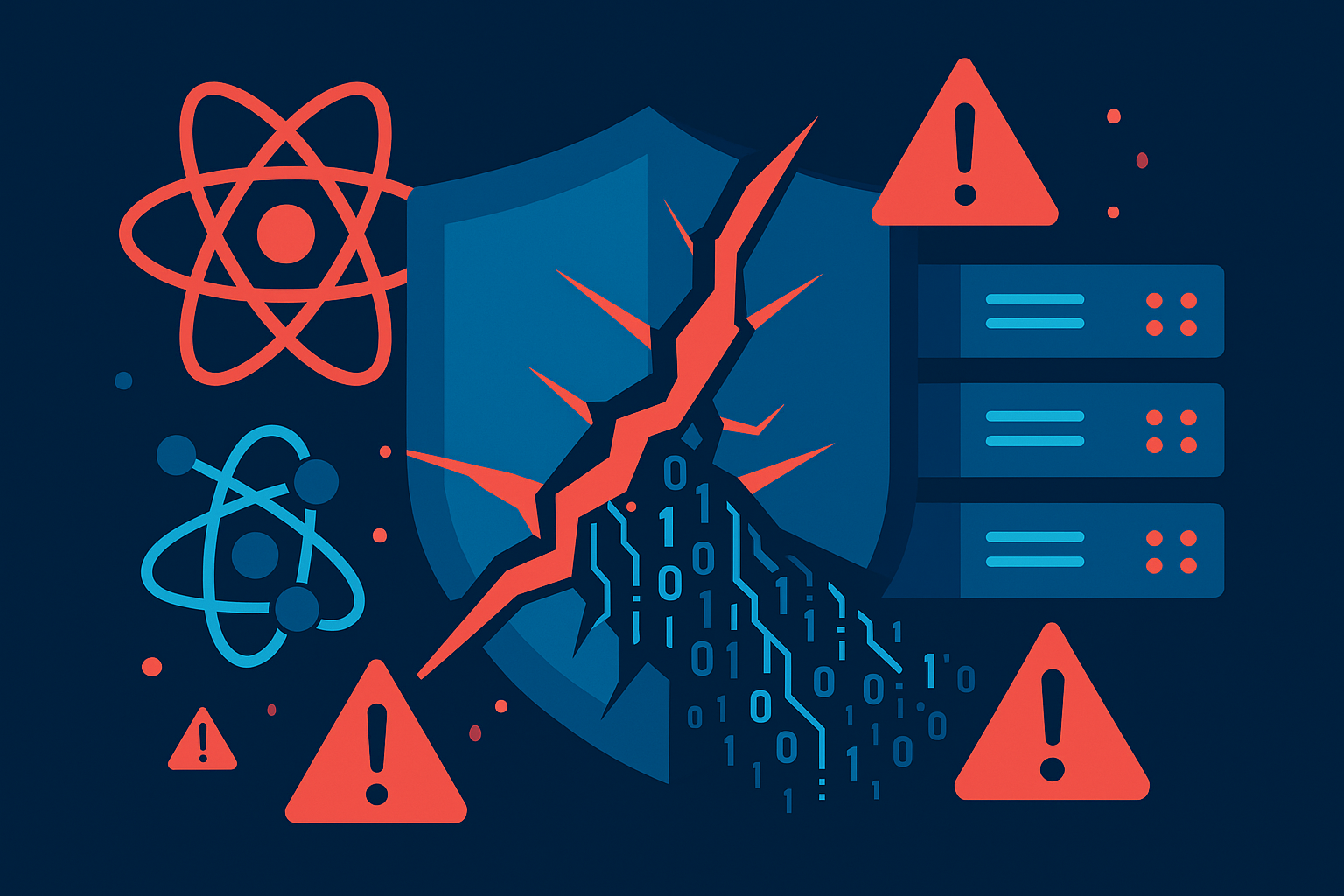Overcoming Deplatforming: Securing Your Business in the Digital Landscape

Overcoming Deplatforming: Securing Your Business in the Digital Landscape
The Deplatforming Dilemma: Examining the Risks and Consequences of Digital Silencing for Businesses
Introduction to the concerns of businesses being deplatformed
Digital platforms are critical to the free flow of information in our society. However, as these platforms grow in size and influence, the question of what businesses get to use them and what content is allowed has become a pressing issue. Deplatforming, the act of banning individuals or organizations from certain platforms due to their views, has become increasingly prevalent in recent years. In this article, we will explore the risks associated with deplatforming and examine some prominent examples of websites that have faced this fate and ways your business can protect itself from the risk of deplatforming.
How Fruition reduces your deplatforming risks
At Fruition, we lead tabletop exercises to walk through where your risks lie and the steps that you’ll have to take to recover from a deplatforming event. Once the risk is understood and matched up with a businesses risk tolerance we can assist or lead the implementation and or development of technologies to bring the risk profile into the desired range. We’re available to discuss your deplatforming risk and options to move forward. We’re also available for urgent work to assist in finding new solutions if you are facing a deplatforming event.
An Overview of Deplatforming and how to Reduce Your Risks
In the following sections we’ll talk about some common alternatives to AWS, GCP, domain registrars, and other important technology providers that have the power to shut down your business with little or no warning.
Risks of Being Deplatformed
What is important to point out is businesses have been deplatformed from major providers such as Shopify and AWS for no reason other than they did not explicitly support a certain political stance or social cause! We are not talking about protecting or preventing criminal enterprises from becoming deplatformed. We are talking about regular businesses, in some cases veteran owned businesses that simply fall out of favor with a platform. We are also not promoting or demoting any social causes or political parties. At Fruition, we are technologists, we are neutral and agnostic in our analysis and recommendations on how to reduce a businesses exposure. While the risks are low they are measurable and real.
The Dangers of Deplatforming a Website or Social Media Account
Deplatforming a business is a dangerous event for a free and capitalist society. Those dangers can be summarized in three buckets of suppression of free speech, the creation of echo chambers, and the strengthening of radical movements.
- Suppression of Free Speech - One of the primary concerns surrounding deplatforming is the potential infringement on freedom of speech. As private entities, digital platforms have the right to moderate content and users on their sites. However, when deplatforming is used to silence opinions and ideas deemed controversial, it can stifle debate and hinder the open exchange of ideas that is central to a healthy democracy.
- Echo Chambers and Polarization- When individuals or groups are deplatformed, they often seek out alternative platforms that cater to their views. This can lead to the creation of echo chambers, where users are only exposed to information that reinforces their existing beliefs. This insulation from diverse perspectives can contribute to increased polarization and a more divided society.
- Strengthening of Radical Movements - Deplatforming can inadvertently amplify the message of the individuals or groups being silenced. By removing them from mainstream platforms, they may be seen as martyrs by their followers, who feel their views are being unjustly suppressed. This can result in increased support and further radicalization.
With the three buckets of deplatformed defined we can discuss some examples of businesses that have been deplatformed.
Examples of Deplatformed Websites and Businesses3
Parler

Parler, a social media platform that positioned itself as a free speech alternative to Twitter and Facebook, was deplatformed in January 2021. Major tech companies such as Apple, Google, and Amazon severed ties with the platform, citing its failure to adequately moderate content that incited violence and spread misinformation. Parler went offline for a month and has since returned with new hosting and moderation policies.
8chan
8chan, an imageboard website known for its controversial and often extremist content, was deplatformed in August 2019. This occurred after the site was linked to several mass shootings, with perpetrators reportedly posting manifestos on the platform. Cloudflare, a web infrastructure and security company, terminated their services to 8chan, effectively removing the site from the internet. While 8chan later resurfaced as 8kun, its reach and influence have been significantly diminished. Most reasonable people would agree that 8chan was not a good place and those that promoted violence are clearly bad people.
Daily Stormer
The Daily Stormer, a neo-Nazi and white supremacist website, was deplatformed in August 2017. Following the violent “Unite the Right” rally in Charlottesville, Virginia, web hosting providers such as GoDaddy and Google refused to host the site, citing its promotion of hate speech. The website has struggled to find a stable online presence since, with various domain registrars and hosting providers refusing to provide services. The Daily Stormer is another example that is hard to argue that it shouldn’t be deplatformed. However, the next example showcases the real danger of a regular business getting caught up and shut down.
Colorado Ped Patrol
These guys probably deserved to be deplatformed. While Colorado Ped Patrol talked about keeping kids safe they apparently decided to make false acquisitions against someone that dug into them. Those aren’t light accusations. The accused fought back resulting in their deplatforming. KDVR: Colorado Ped Patrol Deplatformed
Mike Glover, FieldCraft Survival

Mike Glover is a retired Green Beret and entrepreneur that started a survival company selling training classes and products. He had a ecommerce store on Shopify. Shopify turned off his store and gave him “48 hours to download his data.” He was also kicked off Paypal and effectively banned from Facebook. Glover talks about his experience getting deplatformed on a Joe Rogan episode in February 2023. https://fieldcraftsurvival.com/ https://www.youtube.com/watch?v=7-W_2Ah0dBw FieldCraft was able to migrate to Bigcommerce to continue operations. Another preferred alternative to Shopify is WordPress Woocommerce.
A scary case of a small business being shut down FieldCraft Survival doesn’t fit into the other examples listed above. There is nothing controversial about FieldCraft’s products, teachings, or leadership. The FieldCraft example is one that all businesses should take note of and as a free society we should not tolerate. If FieldCraft can get deplatformed it should make everyone concerned that if you anger the wrong people at powerful companies for unknown reasons then your business can get shut down.
Known Platforms that Deplatform Businesses
Providers that are known to deplatform companies and websites:

- Shopify - Scarcely fast deplatforming. Read about Shopify’s very broad terms and conditions.
- Godaddy - Only in extreme cases.
- Amazon AWS - Known to deplatformed for political views.
- Facebook - Happens fairly often and can be driven by a cancel mob.
- Twitter (pre Musk acquisition as documented in the “Twitter Files”.
- Cloudflare - Only in extreme cases and they seem to reserve deplatforming for extremist views.
- Google - Unknown but likely similar to AWS.
- Apple - Apple has the power of shutting down app installs overnight.
- Twilio - Known to deplatform businesses based on political views.
As you can see these are huge technology companies that have a massive amount of power over websites, apps, and social media profiles. These providers are often a linchpin within a website’s delivery ecosystem. If you rip out one of the pins you might be ok but if you rip out a few you’re likely shut down.
Ways to protect yourself from a deplatforming event
Assuming you run afoul of overreaching terms and conditions according to the providers you may get shut down quickly. To prepare for this you need to understand what technologies you rely on and how they can be replaced. This isn’t dissimilar to a Disaster Recovery (DR) exercise. The absolutely most important consideration is to do your best to keep your customer list up to date and backed up somewhere offline. Do everything you can to keep emails and phone numbers for your customers. Worst case scenario you’ll be able to recreate your business from scratch with your customers. You will likely generate more loyalty and support from your customers if you get deplatformed. However, if you use a platform that relies on the interaction between individuals e.g. a marketplace or a social networking site like Parlar you’re going to have an uphill battle to do it from scratch.
Legal Considerations with Deplatforming
Deplatforming a business from a social media or platform as a service provider involves various laws and regulations, which may vary depending on the jurisdiction. Here are some general legal principles and laws that may come into play:
- Terms of Service and Contract Law: When a business signs up for a social media platform, it agrees to the platform’s Terms of Service (ToS). The ToS constitutes a legally binding contract between the business and the platform, and any deplatforming decision is usually based on violations of the ToS.
- First Amendment and Free Speech (U.S.): In the United States, the First Amendment protects freedom of speech. However, this protection generally applies to government actions and not private companies. Social media platforms, as private entities, have the right to moderate content and enforce their rules, even if it leads to deplatforming.
- Section 230 of the Communications Decency Act (CDA) (U.S.): This law provides social media platforms with protection against liability for content posted by third parties (users). It also allows platforms to moderate content without being considered publishers. Section 230 grants platforms the right to enforce their content policies and remove content or users that violate their rules. Read the DOJ’s overview and comments on 230.
- Anti-Discrimination Laws: Various countries have anti-discrimination laws that protect individuals and businesses from unfair treatment based on specific protected characteristics, such as race, gender, religion, or nationality. In some cases, a business may argue that deplatforming is discriminatory, but this argument would depend on the specific circumstances and jurisdiction.
- Consumer Protection and Competition Laws: In some cases, deplatforming may be challenged under consumer protection or competition laws, particularly if it involves anti-competitive behavior or abuse of market power by the social media platform. However, these claims are usually difficult to prove and depend on the specific circumstances.
- Privacy and Data Protection Laws: Depending on the jurisdiction, privacy and data protection laws, such as the General Data Protection Regulation (GDPR) in the European Union, may have implications for deplatformed businesses. These laws govern the handling and processing of personal data and may affect a business’s access to user data after being deplatformed.
It is important to point out that laws and regulations are very complex and vary by country and jurisdiction. If you are facing deplatforming, it is crucial to consult with a legal professional to understand the specific laws and potential legal remedies applicable to their situation. The legal considerations are only beneficial if you have the time to argue why you shouldn’t be shut down. Often, you won’t be given enough time and your legal requirements will be weak for the reasons listed above. Further, if you’re facing a deplatform challenge you have to be very suspicious of who can access your data at the platform and you must move quickly to secure your data and move to a platform that will allow you to continue operations.
Social Media Deplatforming Risks
When facing deplatforming from marketing and social networking sites such as Twitter, Facebook or Instagram your options to migrate to a new platform are limited. The value in the Twitters of the world is their reach. Pulling out your users isn’t as simple as contact data. You can often argue for why you should stay and there are ways to craft these augments along with future promises of meeting the platform’s expectations to keep you alive as long as possible.

Unlike switching your ecommerce platform it is difficult to replicate the marketing power of the big social media platforms. You can push as many people as you want to your Telegram channel or Signal group yet it is difficult to not be on the other major platforms.
Domain Registrar Cancellation and Takeovers
If your domain registrar takes over your domain your DNS will stop directing traffic to your services, your email will stop working, and you’ll be quickly shut down. Some domain registrars may have a more lenient approach or a stronger commitment to freedom of speech, which could reduce the likelihood of deplatforming. Further, registrars are bound to ARIN’s terms and conditions. A few registrars known for their commitment to freedom of speech or resistance to deplatforming include:
- Epik: Epik has gained a reputation for providing services to websites that have been deplatformed by other registrars. They advocate for free speech and privacy but still reserve the right to enforce their terms of service.
- Njalla: Njalla is a privacy-focused domain registrar that offers a layer of privacy protection by registering domains on behalf of their customers, acting as a middleman. They say their name means a “small hut in the Sápmi forest, built to protect against predators.” Aside from more private domain registrations they also support and host mastodon servers and other cloud storage. They are known for their commitment to protecting free speech.
Please note that using a domain registrar with a reputation for resisting deplatforming does not guarantee that your domain won’t be deplatformed in the future. It is crucial to adhere to the terms of service and follow best practices to minimize the risk of deplatforming. Additionally, reputations and policies can change over time, so it’s essential to stay informed and adapt accordingly.
Credit Card Processor Cancellations
If you can’t process payments you’re in a world of hurt. Credit Card processors and merchant accounts have very strict terms and conditions. It doesn’t take much of a violation to have your processing turned off. Having a backup processor is always a good idea. Having a tertiary payment method such as a bitcoin address that isn’t at a major exchange is always a good idea. There are processors that deal with higher risk accounts however the fees are often very high.
Deplatforming from AWS and GCP
If you’re concerned about deplatforming from AWS or Google Cloud Platform here are some alternatives. AWS makes building web products very efficient. That efficiency also makes it difficult to move away from AWS. If you’re concerned about AWS deplatforming you likely will not be moving to Google Cloud (“GCP”) or Digital Ocean. You’ll instead need to look at open source projects that you can rely on to get you close to the features of AWS or GCP.
Open source alternatives to AWS
There are several open-source alternatives to Amazon Web Services (AWS) that provide cloud computing services and tools. Here is a list of some popular open-source alternatives for various AWS services:
-
Compute: • Alternative to EC2 (Elastic Compute Cloud): OpenStack Nova is an open-source project that provides a cloud computing fabric controller to manage and automate pools of compute resources.
-
Storage: • Alternative to S3 (Simple Storage Service): MinIO is an open-source, high-performance object storage server compatible with Amazon S3 APIs. • Alternative to EBS (Elastic Block Store): Ceph is a distributed storage system that provides block, object, and file system storage in a unified platform.
-
Database: • Alternative to RDS (Relational Database Service): PostgreSQL and MySQL are open-source relational database management systems that can be self-hosted. • Alternative to DynamoDB: Apache Cassandra is a highly scalable, distributed NoSQL database designed to handle large amounts of data across many commodity servers.
-
Containers and Orchestration: • Alternative to ECS (Elastic Container Service) and EKS (Elastic Kubernetes Service): Kubernetes is an open-source container orchestration platform that automates deploying, scaling, and managing containerized applications. • Alternative to Fargate: OpenShift is an open-source container platform by Red Hat, built on top of Kubernetes, that simplifies the deployment and management of containerized applications.
-
Machine Learning: • Alternative to SageMaker: Kubeflow is an open-source project that provides a platform for deploying, monitoring, and maintaining machine learning models on Kubernetes.
-
Analytics: • Alternative to EMR (Elastic MapReduce): Apache Hadoop is an open-source framework for distributed storage and processing of large data sets. Apache Spark is another alternative that offers fast, in-memory data processing for large-scale data analytics.
-
Serverless: • Alternative to Lambda: OpenFaaS (Functions as a Service) is an open-source serverless framework that allows you to build and deploy serverless functions on Kubernetes.
Please note that the features, performance, and support for these open-source alternatives may vary compared to their AWS counterparts. You may need to evaluate and choose the best solutions based on your specific requirements and use cases.
Open Source Alternatives to Cloudflare for CDNs, WAFs, and DDOS Protection
Cloudflare is a great product and a very popular content delivery network (CDN), web infrastructure, and website security company that provides DDoS protection, CDN services, and other security features. If a website is taking heat and at the risk of becoming deplatformed from Cloudflare they run the real risk of being shut down as soon as their DDOS protection goes away. Rolling your own DDOS protection can become very expensive and complex quickly. There isn’t a ready made open source service that is exactly the same as Cloudflare. You can piece together several services that would get you similar feature sets.
Components to piece together to replace Cloudflare:
- CDN:
- Caddy: Caddy is an open-source web server with automatic HTTPS that can be configured as a reverse proxy and load balancer. It does not provide a full CDN service like Cloudflare but can help improve your website’s performance and security.
- jsDelivr: jsDelivr is a free, open-source CDN specifically designed for serving JavaScript files, CSS libraries, and other assets for open-source projects.
2 DDoS Protection:
- There isn’t a direct open-source alternative to Cloudflare’s DDoS protection, as it requires a vast infrastructure to effectively mitigate DDoS attacks. However, you can use open-source tools like fail2ban, iptables, or ModSecurity to strengthen your server’s security and protect against smaller-scale attacks.
- If you are a controversial service having DDOS protection is critical. Without it it is very easy to take down a website.
3 Web Application Firewall (WAF):
- ModSecurity: ModSecurity is an open-source, cross-platform web application firewall (WAF) that provides real-time application security monitoring and access control.
4 DNS:
- PowerDNS: PowerDNS is an open-source DNS server that offers a variety of features, including DNSSEC support and a built-in web-based management interface. Rolling your own DNS service is not for the faint of heart. https://doc.powerdns.com/
- Anycast DNS is also a requirement to avoid many types of DNS DDOS flood attacks. https://labs.ripe.net/author/robert-allen/what-is-anycast-dns-and-why-is-it-important/
Replacements for SendGrid
Amazon SES and SendGrid are popular email delivery services that simplify transactional and marketing email management. Both services have been known to deplatform businesses. Further, SendGrid’s commitment to developers and customer service has gone since they became a publicly traded company. They are focused solely at squeezing each business for the most amount of money possible. One specific and crazy example is charging for the storage of contacts. The storage rate is astronomical. At Fruition, we are migrating clients off of Sendgrid and on to other platforms even those without a risk of becoming deplatformed.
Replacing SendGrid with Open Source Alternatives
While there is no direct open-source alternative offering the same level of service and features, you can find open-source projects that provide email sending capabilities. Here are a few options:
- Postal: Postal is an open-source mail delivery platform that can handle both incoming and outgoing email. It offers features such as webhooks, message tracking, and API support. You can self-host Postal on your own servers, but you’ll need to manage the infrastructure and handle email deliverability.
- Mailu: Mailu is a containerized, open-source mail server solution that integrates Postfix (SMTP server), Dovecot (IMAP server), and other mail-related tools. Mailu simplifies the setup and management of a full email stack, allowing you to send and receive emails for your domain(s). However, you’ll need to manage email deliverability yourself.
- Haraka: Haraka is a highly scalable, open-source SMTP server written in Node.js. It can be used for sending transactional emails, but you’ll need to handle the infrastructure and email deliverability.
Deplatforming from an SMS Provider
When Parler was deplatformed they also got hacked. The hack occurred because the SMS two factor sign up was disabled (again Twilio aka Sendgrid). Like other PaaS products mentioned above there isn’t a direct open-source alternative that offers the same range of services, you can find open-source projects that provide similar functionality for specific components. SMS replacements are difficult because of the required agreements with carriers.
Some options include:
- FreeSWITCH: FreeSWITCH is an open-source telephony platform that provides voice, chat, and video communication capabilities. It supports various communication protocols, such as SIP, and can be used for creating custom VoIP solutions.
- Asterisk: Asterisk is an open-source framework for building communications applications. It supports voice, video, and text communication and can be used for developing custom telephony solutions, including PBX systems, call centers, and IVR systems.
- Kamailio: Kamailio is an open-source SIP (Session Initiation Protocol) server that can be used for building large VoIP infrastructures, such as PBX systems, VoIP gateways, or SIP proxies.
- SignalWire: SignalWire is a cloud communication platform with APIs similar to Twilio. While not entirely open-source, it is built on top of the FreeSWITCH project and offers a more affordable alternative to Twilio for sending SMS messages and making voice calls.
Keep in mind that using these open-source alternatives may require more setup, management, and maintenance compared to using an all-in-one solution like Twilio.
The downside of using Open Source vs Proprietary Services
Using these open-source alternatives requires more setup, management, and maintenance compared to using an all-in-one solution like Cloudflare. Additionally, some of the alternatives mentioned above may not provide the same level of performance, security, or global coverage as Cloudflare, AWS, GCP or similar.
Conclusion
Deplatforming is a complex and divisive issue that requires careful consideration of the balance between upholding free speech and ensuring a safe, inclusive online environment. It is essential for stakeholders, including platform owners, users, and regulators, to engage with their platforms, their user bases, and their technology support teams to reduce the risk and ensure there is a solid business continuity plan. At Fruition, our mission is to Build, Grow, and Protect. This mission aligns closely with reducing the risk to businesses becoming deplatformed. This article was written by Brad Anderson. Brad is an attorney and the founder of Fruition.
FAQs
What is deplatforming?
Deplatforming, the act of banning individuals or organizations from certain platforms due to their views, has become increasingly prevalent in recent years.




